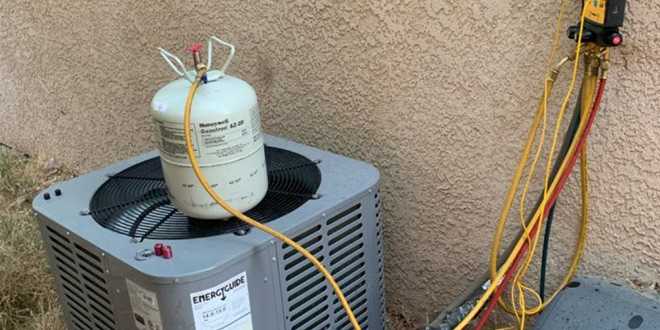
When it comes to maintaining your air conditioning (AC) system, one crucial aspect that often gets overlooked is the proper disposal of refrigerants. Refrigerants are essential for the cooling process, but improper handling and disposal can have severe environmental and health consequences. At All Heart Heating & Cooling, we are committed to ensuring that refrigerant disposal is done responsibly to protect our planet and future generations. In this blog, we will explore why proper refrigerant disposal is vital and how you can contribute to environmental safety.
Understanding Refrigerants: What Are They and Why Are They Harmful?
Refrigerants are chemical compounds used in AC systems to absorb heat and provide cooling. Common types include chlorofluorocarbons (CFCs), hydrochlorofluorocarbons (HCFCs), and hydrofluorocarbons (HFCs). While these substances are efficient in cooling, they pose significant environmental risks.
- Ozone Depletion: Older refrigerants like CFCs and HCFCs have been found to deplete the ozone layer, leading to increased ultraviolet radiation reaching the Earth. This can cause skin cancer, cataracts, and harm to marine life.
- Global Warming: Many refrigerants, particularly HFCs, are potent greenhouse gases. They have a high global warming potential (GWP), meaning they trap heat in the atmosphere much more effectively than carbon dioxide, contributing to climate change.
- Toxicity: Some refrigerants can be toxic if released into the environment, posing health risks to humans and animals.
Understanding the harmful effects of refrigerants underscores the importance of proper disposal. By responsibly managing these substances, we can mitigate their negative impact on the environment and public health.
Regulations and Guidelines for Refrigerant Disposal
Proper refrigerant disposal is not just an environmental responsibility; it is also a legal requirement. Various regulations and guidelines have been established to ensure the safe handling and disposal of refrigerants. Here’s an overview of the key regulations:
- Clean Air Act: In the United States, the Environmental Protection Agency (EPA) regulates the handling and disposal of refrigerants under the Clean Air Act. This legislation requires technicians to be certified in handling refrigerants and mandates specific procedures for their recovery and disposal.
- Montreal Protocol: This international treaty aims to phase out the production and use of ozone-depleting substances, including certain refrigerants. Compliance with the Montreal Protocol is essential for protecting the ozone layer and reducing global warming.
- EPA Section 608: This regulation outlines the mandatory practices for refrigerant handling, including the recovery, recycling, and reclaiming of refrigerants. It also sets forth the certification requirements for technicians.
- State and Local Regulations: In addition to federal guidelines, many states and localities have their own regulations regarding refrigerant disposal. It is crucial to stay informed about these rules to ensure full compliance.
Adhering to these regulations not only helps protect the environment but also prevents hefty fines and legal issues. By following the established guidelines, you contribute to a safer and healthier planet.
Steps for Safe and Responsible Refrigerant Disposal
Proper refrigerant disposal involves several crucial steps to ensure that harmful substances do not escape into the environment. Here’s how you can ensure safe and responsible disposal:
- Hire Certified Professionals: Always engage certified HVAC technicians for refrigerant handling. Certified professionals are trained in proper recovery techniques and understand the legal requirements for disposal.
- Recovery: The first step in refrigerant disposal is recovery, where the refrigerant is extracted from the AC system. This process uses specialized equipment to ensure that no refrigerant is released into the atmosphere.
- Recycling and Reclaiming: Once recovered, refrigerants can either be recycled or reclaimed. Recycling involves cleaning the refrigerant for reuse in the same system, while reclaiming involves processing it to meet industry purity standards for reuse in different systems.
- Disposal: If the refrigerant cannot be recycled or reclaimed, it must be disposed of at a facility equipped to handle hazardous waste. These facilities use methods such as incineration or chemical treatment to neutralize the refrigerant’s harmful effects.
- Documentation: Proper documentation is essential. Ensure that all refrigerant disposal activities are recorded, including quantities recovered and disposed of, as well as the methods used. This documentation is crucial for regulatory compliance.
By following these steps, you ensure that refrigerants are handled safely and responsibly, minimizing their environmental impact.
Environmental and Health Benefits of Proper Disposal
Proper disposal of refrigerants offers numerous benefits for both the environment and public health. Here are some key advantages:
- Reduction in Ozone Depletion: Properly disposing of refrigerants like CFCs and HCFCs prevents them from reaching the atmosphere and depleting the ozone layer. This helps protect all forms of life on Earth from harmful ultraviolet radiation.
- Mitigation of Global Warming: By ensuring that HFCs and other high-GWP refrigerants are not released into the atmosphere, we significantly reduce their impact on global warming. This contributes to the fight against climate change and promotes a more stable climate.
- Improved Air Quality: Some refrigerants can be toxic and contribute to air pollution if not disposed of correctly. Proper disposal prevents these substances from contaminating the air we breathe, leading to healthier communities.
- Protection of Ecosystems: When refrigerants are released into the environment, they can harm wildlife and disrupt ecosystems. Proper disposal helps preserve biodiversity and maintain balanced ecosystems.
- Public Health Safety: Exposure to improperly handled refrigerants can cause respiratory issues, skin irritation, and other health problems. Ensuring safe disposal protects public health and reduces the risk of accidental exposure.
By committing to proper refrigerant disposal, we not only adhere to regulatory requirements but also contribute to a healthier planet and community.
Choosing a Certified Disposal Service
Selecting the right disposal service is crucial for ensuring that refrigerants are handled and disposed of correctly. Here are some tips for choosing a certified disposal service:
- Check Certifications: Ensure that the disposal service is certified by relevant authorities, such as the EPA. Certified services follow stringent guidelines and have the necessary training to handle refrigerants safely.
- Experience and Reputation: Look for a company with a proven track record in refrigerant disposal. Read reviews, ask for references, and check their history of compliance with environmental regulations.
- Proper Equipment: The service should have the appropriate equipment for refrigerant recovery, recycling, and disposal. This includes certified recovery machines and recycling units that meet industry standards.
- Transparent Practices: Choose a service that provides clear and transparent documentation of their disposal processes. They should be able to provide records of refrigerant recovery, recycling, and disposal, ensuring full compliance with regulations.
- Environmental Commitment: Opt for a service that demonstrates a commitment to environmental sustainability. This can include practices such as recycling refrigerants whenever possible and using environmentally friendly disposal methods.
- Customer Service: Good customer service is essential. The disposal service should be responsive, provide clear communication, and be willing to answer any questions you may have about their processes.
By choosing a certified and reputable disposal service, you ensure that refrigerants are managed responsibly, protecting both the environment and public health.
Conclusion: Commitment to a Greener Future
Proper disposal of refrigerants is essential for protecting our environment and ensuring the safety of our communities. At All Heart Heating & Cooling, we are dedicated to promoting responsible refrigerant management through our services and practices. By understanding the harmful effects of refrigerants and adhering to regulations, we can significantly reduce their environmental impact.
As a company, we strive to set an example by using certified professionals and following industry best practices for refrigerant disposal. We encourage our customers to prioritize environmental responsibility by choosing services that align with these values. Together, we can make a difference and contribute to a greener, healthier future.
For more information on our AC services, including AC repair, AC installation, and AC maintenance, or to contact us directly, visit our contact page.
Thank you for joining us in this important effort to protect our planet.




